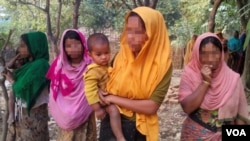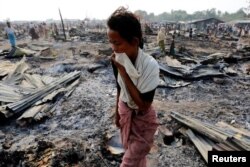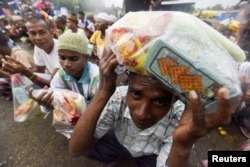The government of Myanmar says it needs "firm evidence" rather than allegations before it investigates U.N. reports of abuses against the Rohingya community by its security forces.
The United Nations special adviser on the prevention of genocide, Adama Dieng, has said Myanmar's Rohingya have suffered abuses that could be considered "crimes against humanity."
"Our position is clear: These allegations are very serious," the permanent secretary of Myanmar's foreign ministry, U Kyaw Zaya, said Tuesday. "However, allegations alone are not enough. If they give us firm evidence, we will investigate these allegations."
U.N. adviser Dieng said Monday: "If people are being persecuted based on their identity and killed, tortured, raped and forcibly transferred in a widespread or systematic manner, this could amount to crimes against humanity, and in fact be the precursor of other egregious international crimes."
A "flash report" last week by the Office of the U.N. High Commissioner for Human Rights (OHCHR) gave weight to allegations that Myanmar's security forces have committed serious human-rights violations against civilians in northern Rakhine state since a recent escalation of violence there, according to Dieng.
Human Rights Watch issued a report Monday alleging government forces committed rape and other sexual violence against Rohingya women and girls as young as 13 during security operations in northern Rakhine state in late 2016.
Dieng has called for an investigation "by a truly independent and impartial body that includes international observers." A U.N. statement Monday said he has expressed concern that the commission previously appointed by Myanmar to investigate abuse allegations had found no evidence, or insufficient evidence, of any wrongdoing by government forces.
Attacks against the Rohingya population, most of whom live in Myanmar's Rakhine state, appear to have been widespread and systematic during the recent outburst of violence, which began last October 9 when nine border guards were killed by suspected insurgents.
A Muslim ethnic group, the Rohingya have been denied citizenship despite having lived in Myanmar for generations. The United Nations has referred to them as one of the world's most persecuted minorities.
OHCHR's 43-page "flash report" resulted from interviews conducted during two weeks in January by U.N. investigators in the Bangladeshi city of Cox's Bazar, near the border with Myanmar. Many Rohingya there had fled across the border in response to a security sweep in Myanmar's Rakhine state.
An estimated 66,000 Rohingya fled into Bangladesh from Rakhine, while another 22,000 have been internally displaced since October, OHCHR reported.
All witnesses interviewed by the U.N. said the abuses were committed by members of the Myanmar army, border guards and part of the regular police forces.
A spokesman for the Myanmar government, which was provided an advance copy of the report, told VOA last week it will conduct its own investigation into the charges.
"We found out that what they have written in the report is quite harsh," said Zaw Htay, spokesman for President Htin Kyaw. "We are deeply concerned about it. Vice President U Myint Swe will lead a commission investigating these allegations as soon as possible. If the investigation finds and receives firm evidence on the allegations, we will take necessary actions."
VOA’s Shar Phaung contributed to this report.







